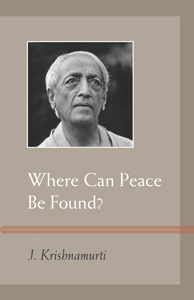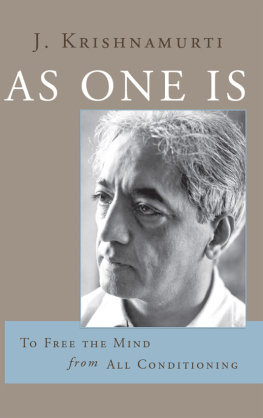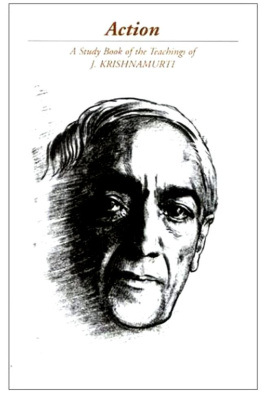Krishnamurti - The Flame of Attention
Here you can read online Krishnamurti - The Flame of Attention full text of the book (entire story) in english for free. Download pdf and epub, get meaning, cover and reviews about this ebook. publisher: Mirananda, genre: Religion. Description of the work, (preface) as well as reviews are available. Best literature library LitArk.com created for fans of good reading and offers a wide selection of genres:
Romance novel
Science fiction
Adventure
Detective
Science
History
Home and family
Prose
Art
Politics
Computer
Non-fiction
Religion
Business
Children
Humor
Choose a favorite category and find really read worthwhile books. Enjoy immersion in the world of imagination, feel the emotions of the characters or learn something new for yourself, make an fascinating discovery.

- Book:The Flame of Attention
- Author:
- Publisher:Mirananda
- Genre:
- Rating:4 / 5
- Favourites:Add to favourites
- Your mark:
- 80
- 1
- 2
- 3
- 4
- 5
The Flame of Attention: summary, description and annotation
We offer to read an annotation, description, summary or preface (depends on what the author of the book "The Flame of Attention" wrote himself). If you haven't found the necessary information about the book — write in the comments, we will try to find it.
The Flame of Attention — read online for free the complete book (whole text) full work
Below is the text of the book, divided by pages. System saving the place of the last page read, allows you to conveniently read the book "The Flame of Attention" online for free, without having to search again every time where you left off. Put a bookmark, and you can go to the page where you finished reading at any time.
Font size:
Interval:
Bookmark:
The Flame of Attention
Copyright 1983 Krishnamurti Foundation Trust Ltd.
J. Krishnamurti
THE FLAME
OF ATTENTION
CONTENTS
INDIA
1. - 31st October, 1981.
2. - 8th November, 1981.
3. - 26th November, 1981.
4. - 27th December, 1981.
5. - 6th February, 1982.
UNITED STATES OF AMERICA
6. - 27th March, 1982.
7. - 1st May, 1982.
SWITZERLAND
8. - 15th July, 1982.
ENGLAND
9. - 4th September, 1982.
Observation, like a flame of attention, it wipes away hate.
Brockwood Park, 28th August, 1982.
Observation is like a flame which is attention, and with that capacity of observation, the wound, the feeling of hurt, the hate, all that, is burnt away, gone.
Brockwood Park, 29th August, 1982.
NEW DELHI
I would like to point out that we are not making any kind of propaganda, for any belief, for any ideal or for any organization. Together we are considering what is taking place in the world outside of us. We are looking at it not from an Indian point of view, or from a European or American, or from any particular national interest. Together we are going to observe what actually is going on in the world. We are thinking together but not as having one mind. There is a difference between having one mind and thinking together. Having one mind implies that we have come to some conclusion, that we have come to certain beliefs, certain concepts. But thinking together is quite different. Thinking together implies that you and the speaker have a responsibility to look objectively, non-personally, at what is going on. So we are thinking together. The speaker, though he is sitting on a platform for convenience, has no authority. Please, we must be very clear on this point. He is not trying to convince you of anything. He is not asking you to follow him. He is not your guru. He is not advocating a particular system, particular philosophy, but that we observe together, as two friends who have known each other for some time, who are concerned not merely about our private lives, but are together looking at this world which seems to have gone mad.
The whole world is arming, spending incredible amounts of money to destroy human beings, whether they live in America, Europe, or Russia, or here. It is taking a disastrous course which cannot possibly be solved by politicians. We cannot rely on them; nor on the scientiststhey are helping to build up the military technology, competing each against another. Nor can we rely on the so-called religions; they have become merely verbal, repetitive, absolutely without any meaning. They have become superstitions, following mere tradition, whether of five thousand years or two thousand years. So we cannot rely on the politicians who are throughout the world seeking to maintain their position, their power, their status; nor can we rely on the scientists, who each year, or perhaps each week, are inventing new forms of destruction. Nor can we look to any religion to solve this human chaos.
What is a human being to do? Is the crisis intellectual, economic, or national, with all the poverty, confusion, anarchy, lawlessness, terrorism and always the threat of a bomb in the street? Observing all that, what is our responsibility? Are you concerned with what is happening in the world? Or are you merely concerned with your own private salvation? Please do consider all this very seriously, so that you and the speaker observe objectively, what is taking place, not only outwardly, but also in our consciousness, in our thinking, in the way we live, in our actions. If you are not at all concerned with the world but only with your personal salvation, following certain beliefs and superstitions, following gurus, then I am afraid it will be impossible for you and the speaker to communicate with each other. We must be clear on this point. We are not concerned at all with private personal salvation but we are concerned, earnestly, seriously, with what the human mind has become, what humanity is facing. We are concerned as human beings, human beings who are not labelled with any particular nationality. We are concerned in looking at this world and what a human being living in this world has to do, what is his role?
Every morning, in the newspapers, there is some kind of murder, bomb outrage, destruction, terrorism, and kidnapping; you read it every day and you pay little attention to it. But if it happens to you personally then you are in a state of confusion, misery and asking somebody else, the government or the policeman, to save you, to protect you. And in this country, when you look, as the speaker has for the last sixty years, watching all the phenomena in this unfortunate country, you see the poverty, which never seems to be solved, the overpopulation, the linguistic differences, one community wanting to break away from the rest, the religious differences, the gurus who are becoming enormously rich, with their private aeroplaneswhich you are accepting blindlyyou see that you are not capable of doing anything about it. This is a fact. We are not dealing with ideas, we are dealing with facts, with what is actually taking place.
And, if we are to observe together, we must be free of our nationalism. We human beings are interrelated, wherever we live. Please realize this, how serious, how urgent it all is. For in this country people have become lethargic, totally indifferent to what is going on, utterly careless, only concerned about their own little salvation, little happiness.
We live by thought. What is the operation, or the process and the content of thinking? All the temples result from thought; and all that goes on inside the temples, the images, all the puja, all the ceremonies, are the result of thought. All the sacred booksUpanishads, the Gita and so onare the result of thought, the expression of thought in print, to convey what somebody else has experienced or thought about. And the word is not sacred. No book in the world is sacred, simply because it is the result of mans thought. We worship the intellect. Those who are intellectual are seen as apart from you and me who are not intellectual. We respect their concepts, their intellect. Intellect, it is thought, will solve our problems, but that is not possible, it is like developing one arm out of proportion to the rest of the body. Neither the intellect, nor the emotions, nor romantic sentimentality, are going to help us. We have to face things as they are, to look at them very closely and see the urgency of doing something immediately, not leaving it to the scientist, the politician and the intellectual.
So, first of all, let us look at what the human consciousness has become; because our consciousness is what we are. What you think, what you feel, your fears, your pleasures, your anxieties and insecurity, your unhappiness, depressions, love, pain, sorrow and the ultimate fear of death are the content of your consciousness; they are what you arethey are what makes you, the human being. Unless we understand that content and go beyond itif it is possiblewe shall not be able to act seriously, fundamentally, basically, to bring about a transformation, a mutation, in this consciousness.
To find out what right action is we must understand the content of our consciousness. If ones consciousness is confused, uncertain, pressurized, driven from one corner to another, from one state to another, then one becomes more and more confused, uncertain, and insecure; from that confusion one cannot act. So one depends on somebody elsewhich man has done for thousands of years. It is of primary importance to bring about order in ourselves; from that inward order there will be outward order. We are always seeking outward order. We want order in the world established through strong governments, or through totalitarian dictatorships. We all want to be pressurized to behave rightly; remove that pressure and we become rather what we are in the present India. So it becomes more and more urgent on the part of those who are serious, who are facing this terrible crisis, to find out for ourselves what our consciousness is and to free that consciousness of its content, so that we become truly religious people. As it is we are not religious people, we are becoming more and more materialistic.
Next pageFont size:
Interval:
Bookmark:
Similar books «The Flame of Attention»
Look at similar books to The Flame of Attention. We have selected literature similar in name and meaning in the hope of providing readers with more options to find new, interesting, not yet read works.
Discussion, reviews of the book The Flame of Attention and just readers' own opinions. Leave your comments, write what you think about the work, its meaning or the main characters. Specify what exactly you liked and what you didn't like, and why you think so.







